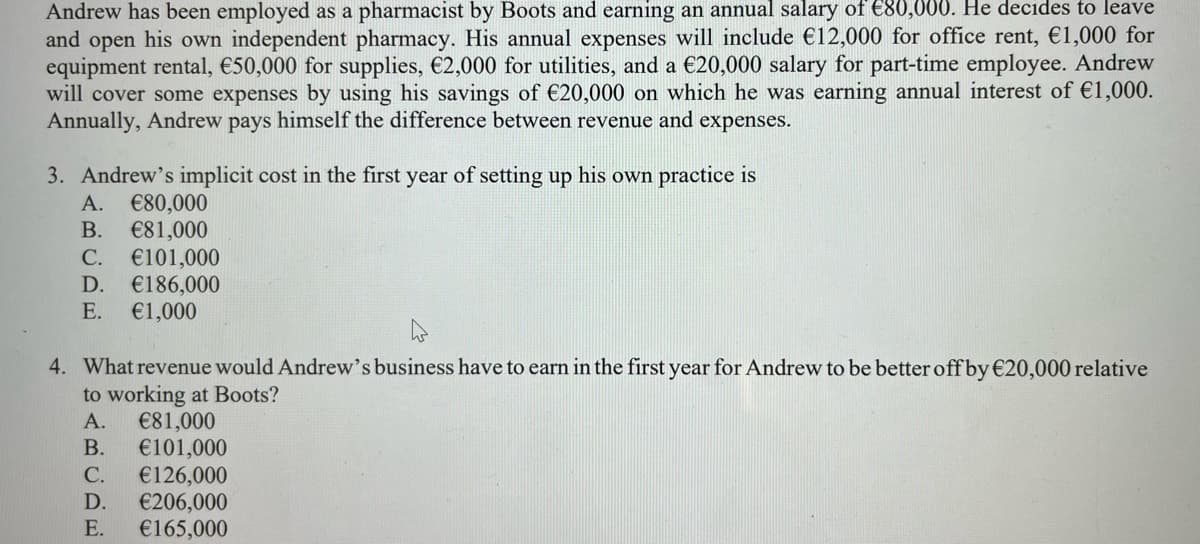and open his own independent pharmacy. His annual expenses will include €12,000 for office rent, €1,00 equipment rental, €50,000 for supplies, €2,000 for utilities, and a €20,000 salary for part-time employee. Ar will cover some expenses by using his savings of €20,000 on which he was earning annual interest of EI Annually, Andrew pays himself the difference between revenue and expenses. 3. Andrew's implicit cost in the first year of setting up his own practice is A. €80,000 B. €81,000 C. €101,000 D. €186,000 E. €1,000 4. What revenue would Andrew's business have to earn in the first year for Andrew to be better off by €20,000 rel to working at Boots? A. €81,000 D 6101.000
and open his own independent pharmacy. His annual expenses will include €12,000 for office rent, €1,00 equipment rental, €50,000 for supplies, €2,000 for utilities, and a €20,000 salary for part-time employee. Ar will cover some expenses by using his savings of €20,000 on which he was earning annual interest of EI Annually, Andrew pays himself the difference between revenue and expenses. 3. Andrew's implicit cost in the first year of setting up his own practice is A. €80,000 B. €81,000 C. €101,000 D. €186,000 E. €1,000 4. What revenue would Andrew's business have to earn in the first year for Andrew to be better off by €20,000 rel to working at Boots? A. €81,000 D 6101.000
Chapter4: Income Exclusions
Section: Chapter Questions
Problem 50P
Related questions
Question

Transcribed Image Text:Andrew has been employed as a pharmacist by Boots and earning an annual salary of €80,000. He decides to leave
and open his own independent pharmacy. His annual expenses will include €12,000 for office rent, €1,000 for
equipment rental, €50,000 for supplies, €2,000 for utilities, and a €20,000 salary for part-time employee. Andrew
will cover some expenses by using his savings of €20,000 on which he was earning annual interest of €1,000.
Annually, Andrew pays himself the difference between revenue and expenses.
3. Andrew's implicit cost in the first year of setting up his own practice is
A. €80,000
B. €81,000
C. €101,000
D. €186,000
E. €1,000
4
4. What revenue would Andrew's business have to earn in the first year for Andrew to be better off by €20,000 relative
to working at Boots?
€81,000
A.
B. €101,000
C. €126,000
D. €206,000
E. €165,000
Expert Solution
This question has been solved!
Explore an expertly crafted, step-by-step solution for a thorough understanding of key concepts.
Step by step
Solved in 2 steps

Recommended textbooks for you



Pfin (with Mindtap, 1 Term Printed Access Card) (…
Finance
ISBN:
9780357033609
Author:
Randall Billingsley, Lawrence J. Gitman, Michael D. Joehnk
Publisher:
Cengage Learning



Pfin (with Mindtap, 1 Term Printed Access Card) (…
Finance
ISBN:
9780357033609
Author:
Randall Billingsley, Lawrence J. Gitman, Michael D. Joehnk
Publisher:
Cengage Learning


